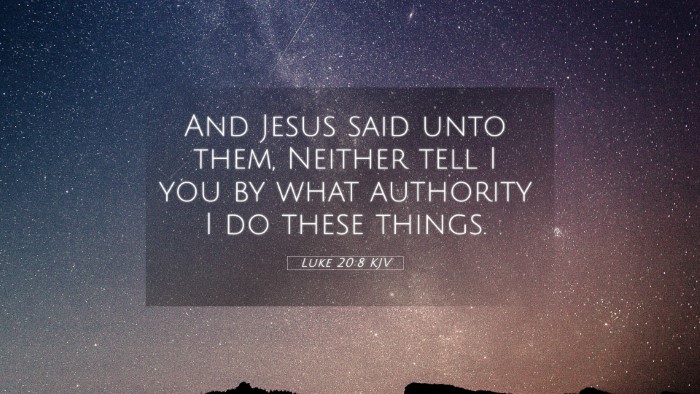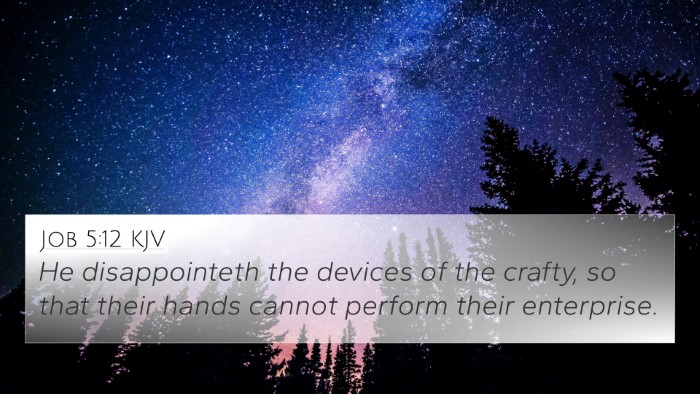Understanding Luke 20:8
Verse: Luke 20:8 - "And Jesus said unto them, Neither tell I you by what authority I do these things."
Summary of Luke 20:8
This verse follows an interaction where religious leaders challenge Jesus about the authority He wields in His teaching and miracles. Instead of providing a direct answer, Jesus reframes the conversation, turning the inquiry back to the challengers. This moment exemplifies His wisdom in addressing traps set by political and religious authorities.
Interpretation from Commentaries
-
Matthew Henry's Commentary
Henry emphasizes that by withholding His authoritative source, Jesus highlights the inconsistency and insincerity of His questioners. He points out that their own refusal to acknowledge John's authority undermines their credibility. Henry insists that spiritual authority is not always understood or accepted by those entrenched in tradition.
-
Albert Barnes' Notes
Barnes delves into the significance of Jesus' tactful redirection in this verse. He notes that Jesus challenges the leaders to consider whether they genuinely desired the truth or merely aimed to entrap Him. Barnes also suggests that this moment showcases Jesus as the ultimate authority who understands the hearts of men.
-
Adam Clarke's Commentary
Clarke analyzes the context, emphasizing Jesus' knowledge of the mindset of those who confront Him. By not revealing His source of authority, Clarke argues that Jesus invites deeper contemplation on the nature of divine authority and encourages listeners to seek understanding beyond their surface-level inquiries.
Cross-References to Luke 20:8
To gain further insight into this verse, consider the following cross-references:
- Matthew 21:23-27 - Jesus queried about the baptism of John.
- Mark 11:27-33 - Parallel account of the religious authorities questioning Jesus' authority.
- John 1:19-27 - The Pharisees' inquiry about John the Baptist's authority.
- Luke 7:29-30 - Discussion on the reception of John’s authority.
- Acts 4:7 - The Sanhedrin questioning the apostles about their teaching authority.
- Romans 13:1 - Discusses the authority being instituted by God.
- James 4:7 - Calling for submission to God as the ultimate authority.
- Matthew 28:18 - Jesus declares His authority in heaven and on earth.
- 1 Corinthians 1:25 - The wisdom of God compared to the wisdom of man.
Thematic Connections and Analysis
This verse opens avenues for thematic Bible verse connections regarding authority, truth, and the response to divine revelation. Jesus consistently points backward to the truth revealed through the prophets and testifies to His divine mission.
Exploring Authority in Scripture
- Authority of God: Reflected in Romans 13:1, understanding that all authority origination is divine.
- Recognizing Divine Authority: As depicted in Matthew 21:23-27 and Mark 11:27-33, ancient leaders often conflict with divine authority.
- Seeking Truth: Scripture emphasizes the importance of seeking truth genuinely (John 8:32).
Tools for Biblical Cross-Referencing
Utilizing a Bible concordance can significantly enhance your understanding and aid in connecting scriptures effectively. Here are some essential tools:
- Bible Concordance - An essential tool for finding keywords and related verses.
- Cross-Reference Bible Study - A methodical approach to interlinking scriptures.
- Bible Cross-Reference Guide - Specially designed materials to help navigate through biblical texts.
- Bible Reference Resources - Include various studies and interpretations, leading to deeper insight.
Conclusion
Luke 20:8 serves as a profound reminder of the interplay between divine authority and human questioning. Through careful study and cross-referencing with other scriptures, believers can uncover the deeper truths and themes that interconnect throughout the Bible.
Encouragement for Study
For those engaged in Bible study, utilizing cross-referencing techniques and tools can enhance understanding and reveal the intricate dialogues present within the scriptures. Consider reflecting on how Jesus' response in Luke 20:8 invites us to examine not just questions of authority but also our own willingness to seek the truth in humility and sincerity.









